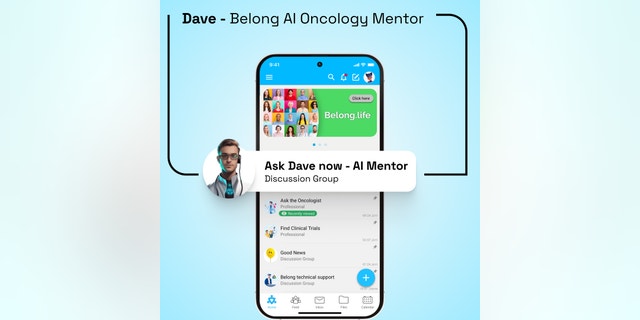Cancer patients looking for quick answers or support between their appointments can now turn to “Dave,” an artificial intelligence chatbot trained to discuss all things related to oncology.
Launched earlier this month by Belong.Life, a New York-based health technology company, Dave is described as the world’s first conversational AI oncology mentor for cancer patients.
“Dave has aided patients in understanding their situations and equipping them with valuable information to engage in informed discussions with their physicians,” said Irad Deutsch, co-founder and CTO of Belong, in an interview with Fox News Digital.
AI SHOWN TO PREDICT RISK OF PANCREATIC CANCER WELL BEFORE SYMPTOMS APPEAR

Launched earlier this month by Belong.Life, a New York-based health technology company, “Dave” is described as the world’s first conversational AI oncology mentor for cancer patients. (iStock)
“We understand the immense stress that arises when questions arise, even at 2 a.m., and there’s no one available to provide answers.”
The team’s goal in creating Dave, he said, was to alleviate patients’ stress levels and reduce their anxiety by delivering comprehensive, real-time answers around the clock.
The chatbot was named after the biblical King David, Deutsch said, who employed his wisdom to triumph over Goliath.
“This empathetic approach is particularly crucial for cancer patients, who find themselves in a highly sensitive phase of their lives,” he said.
Where Dave gets its data
Dave was trained on “billions of data points” from seven years’ worth of interactions between patients and physicians.
These interactions were aggregated from Belong’s Beating Cancer Together app, a social and professional network for cancer patients, according to Deutsch.
Dave in action
More than 10,000 people with cancer to date have tested the AI cancer chatbot — including Mark Werner, a construction company owner from the Atlanta area. He was diagnosed in 2018 with multiple myeloma, a rare blood cancer.
Werner has been using Belong’s Beating Cancer Together app since 2021, connecting with other patients and getting support while navigating his own cancer journey.
“[Dave] alleviates patients’ stress levels [and] reduces the amount of time physicians need to spend educating patients.”
“I also read many of the questions that other people ask, and I’ve found Dave’s answers to be spot-on,” he said.
Dave isn’t designed to offer specific advice, Werner noted. Rather, the chatbot will offer up available options for each patient.

Dave’s sources include patient-physician chats, patient-patient chats, documents and patient-reported outcomes. (Belong.Life )
When it comes to giving comfort to a patient or serving up general information about treatments or side effects, Dave can be a great resource, Werner said.
“He will sympathize with you about a particular ailment, but if it’s not cancer-related, Dave will tell you that he is not qualified to answer the question and will defer you to another direction to get your answer,” Werner explained.
Deutsch shared another case in which a woman’s husband was battling cancer in an advanced stage.
She was one of the first to use Dave, seeking various ways to support her husband during those challenging times.
“The ability to have both Dave and real human physicians available within a single platform is what makes the Belong app so appealing to patients,” Deutsch said.
The main benefit of Dave, he said, is that it can provide patients with immediate, informative answers, while physicians typically require more response time.
Designed to minimize risk
While Dave relies on responses from real physicians, Deutsch acknowledged that even actual doctors can make mistakes.
“Also, the machine can misinterpret patient questions or encounter situations where insufficient information is provided by the patients themselves,” he said.
“In cancer care, treatment decisions always involve human oncologists.”
They found that 91% of the answers were highly accurate, 9% were partially accurate and none were partially inaccurate or completely incorrect, Deutsch said.
CLICK HERE TO SIGN UP FOR OUR HEALTH NEWSLETTER
The patients can also submit their feedback on the quality of Dave’s responses.
“In cancer care, treatment decisions always involve human oncologists, ensuring a human element in the process.”

